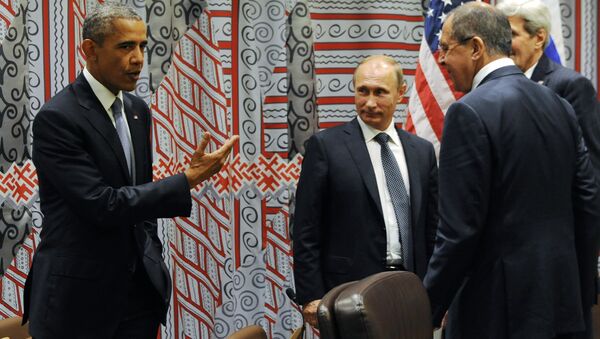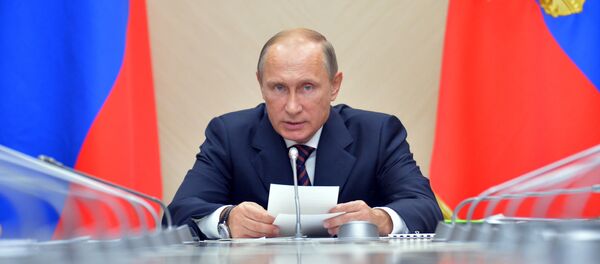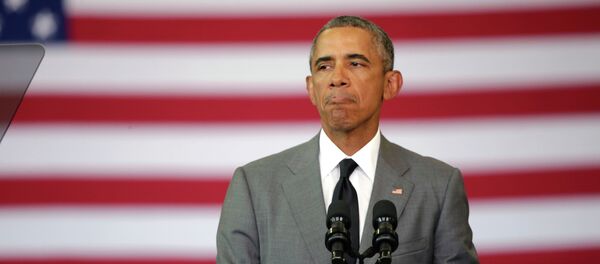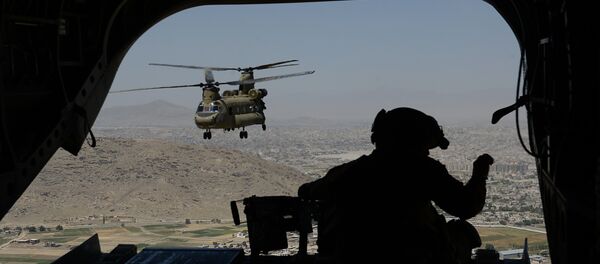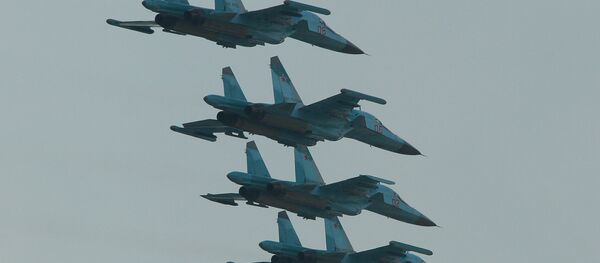Speaking to Kommersant journalist Svetlana Suhova in an interview published on the website of Carnegie Moscow Center, where he serves as a scholar in residence, Arbatov noted that if Russia and the US could agree to coordinate their activities in Syria, they could also come to an agreement on other issues, including the crisis in Ukraine.
Arbatov, who also heads Russia's influential Institute of World Economy and International Relations (IMEMO), suggested that such agreement could even help lead to the West eventually rolling back its anti-Russian sanctions. He also noted, however, that now is not the time for leaders in Moscow and Washington to rest on their laurels, with several important issues, including the danger of nuclear war, still outstanding.
In his words, Russian and US "actions in Syria must be coordinated: It's important for them not to hit one another. Syria is a real patchwork, where the positions of Assad's forces, the armed opposition, Islamic State militants and the Kurds overlap with one another."
The analyst suggested that in order for head-to-head clashes to be averted, US and Russian operations "must be conducted at least parallel to one another, if not united –to be coordinated." Arbatov suggested that the establishment of a direct link between Russia's defense ministry and the Pentagon was a good place to start.
From 'Assad Must Go' to 'Meh'
"After all," the analyst explained, in "insisting on his departure, Washington never could explain who would come to succeed him ahead of elections. It seems that the US has finally realized that the alternative to Assad is not the moderate opposition, but radical Islamists, if not outright terrorists."
Commenting on Assad's fate as Syria's leader, Arbatov pointed out that "as soon as the fighting between government and opposition forces can be halted, it will be possible to hold elections (under international control, of course)." These elections, in his words, "will decide Assad's fate. Perhaps he will be forced to leave, but maybe he could even win the election. Who knows? History has known such precedents, and more than one."
Precedents for Establishing Lasting Peace Exist
The academic noted that "it's worth only to remember Tajikistan. In the early 1990s, the country faced a terrible civil war, invisible to the rest of the world, which resulted in the deaths of over 120,000 people. It seemed that we could not even dream of a peace settlement being reached, but it was made possible, and two factors helped. One was the existence of a common enemy, the Taliban, which had massacred both Tajiks and Uzbeks in Afghanistan and emerged along the Panj River border between Tajikistan and Afghanistan. The other was the strong diplomatic pressure from Russia, Iran and the US. As a result, the Tajiks formed a national unity government, which continues to exist to this day, while the Northern Alliance coalition, together with the air support of its foreign allies, helped to defeat the Taliban."
In fact, Arbatov noted, "were it not for the American adventure in Iraq in 2003, which destroyed the anti-terrorist coalition, we would have an entirely situation in Afghanistan, and not the one which exists at present, where the Taliban has been carrying out its revenge following the departure of the US and its allies."
Russian-US Cooperation in Syria Could Lower Tensions in Ukraine
Instead, the analyst suggested that "events in Ukraine could go smoothly without any 'trades' – if passions were to fall in the course of cooperation in Syria." Arbatov recalled hopefully that the conflict in eastern Ukraine has been dormant since early September, and that an agreement has even been reached on the withdrawal of 100mm weapons from the conflict zone. Noting that the Russian president's position provided an important incentive for the two sides to compromise, he suggested that "now it's time for the Norman Quartet to agree on the timing of elections and the other political parameters of the Minsk Agreement."
The scholar suggested that if agreement in Syria is reached, and the peace process continues to advance in eastern Ukraine, "part of the anti-Russian sanctions could be lifted before the end of the year, particularly their financial portion." These, in his words, would not end the Russian economic slump, "but they would help to slow economic decline or even to stop it by reviving economic activity, job creation, and the replenishment of the budget."
Iran Deal a Boon Both for Russia and for Syria
Commenting on the fortunate timing of the West's 'rehabilitation' of Iran in connection with the agreement reached on the country's nuclear program, Arbatov suggested that common goals in the battle against ISIL is sure to work not only to strengthen the Russian-Iranian partnership, but to rub off favorably on the West's perception of Syria and Assad as well.
"After all, Arbatov noted, "once Washington and, to a lesser extent, Tel Aviv, came to be convinced that Iran's new leadership, in the face of President Rouhani, actually wants to improve relations with the West, much has changed. Earlier, [one of the main accusations] against Assad was that he and Hezbollah, which operates on his territory, were Iranian puppets in the country's struggle against Israel. Now, with Tehran shifting away from its anti-Israeli and anti-American policy, US attitudes toward Assad are also changing; perhaps not in words, but in practice."
